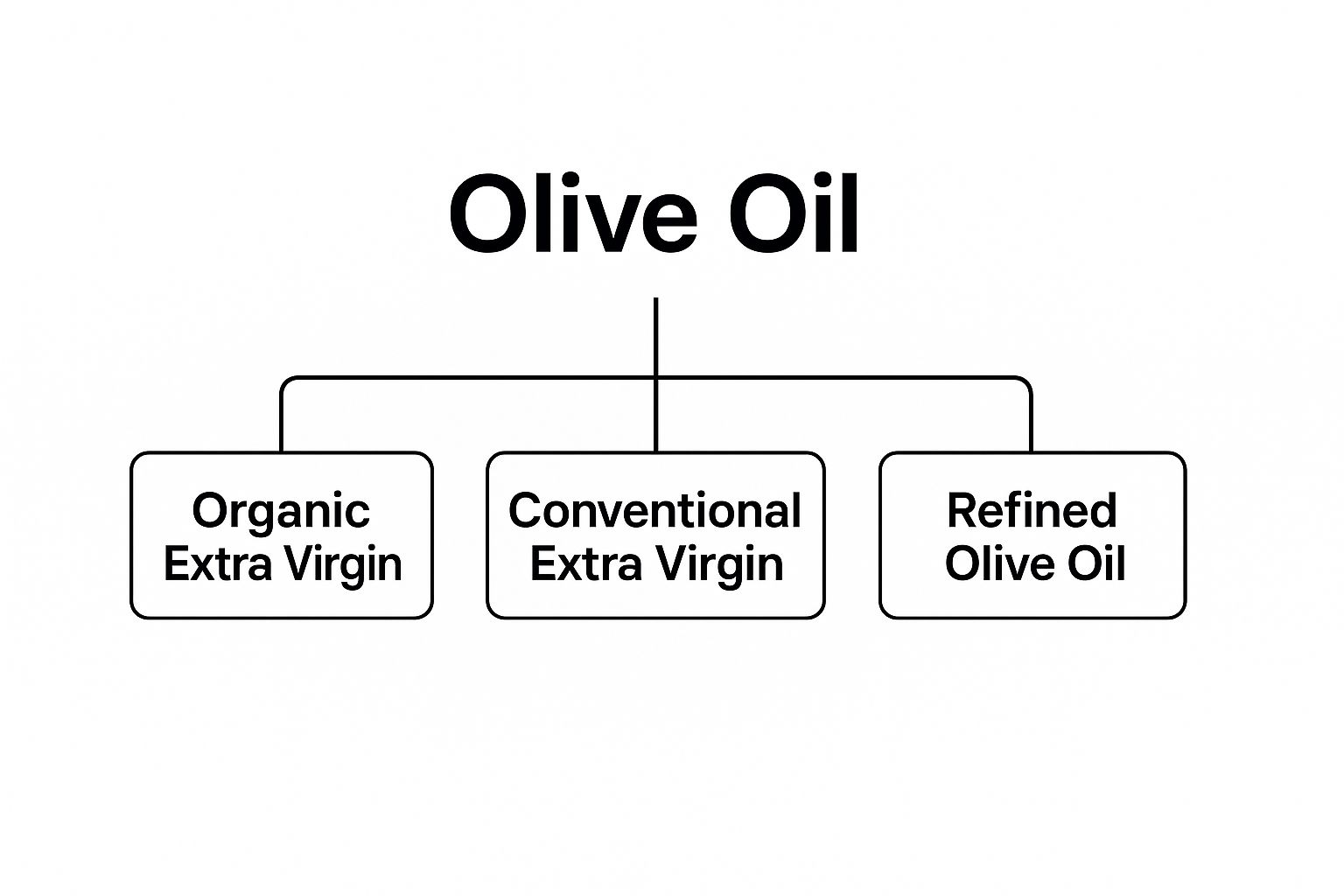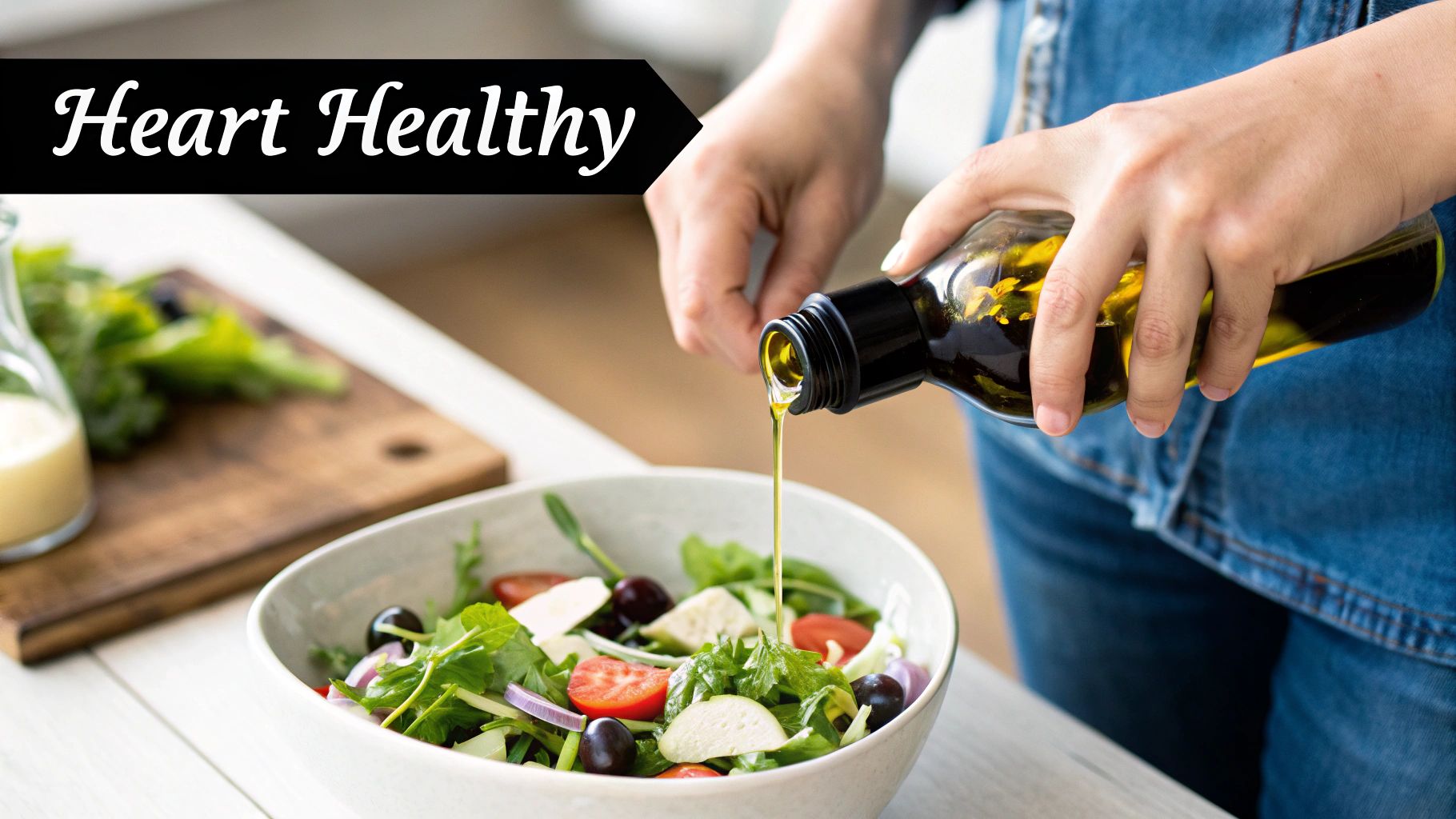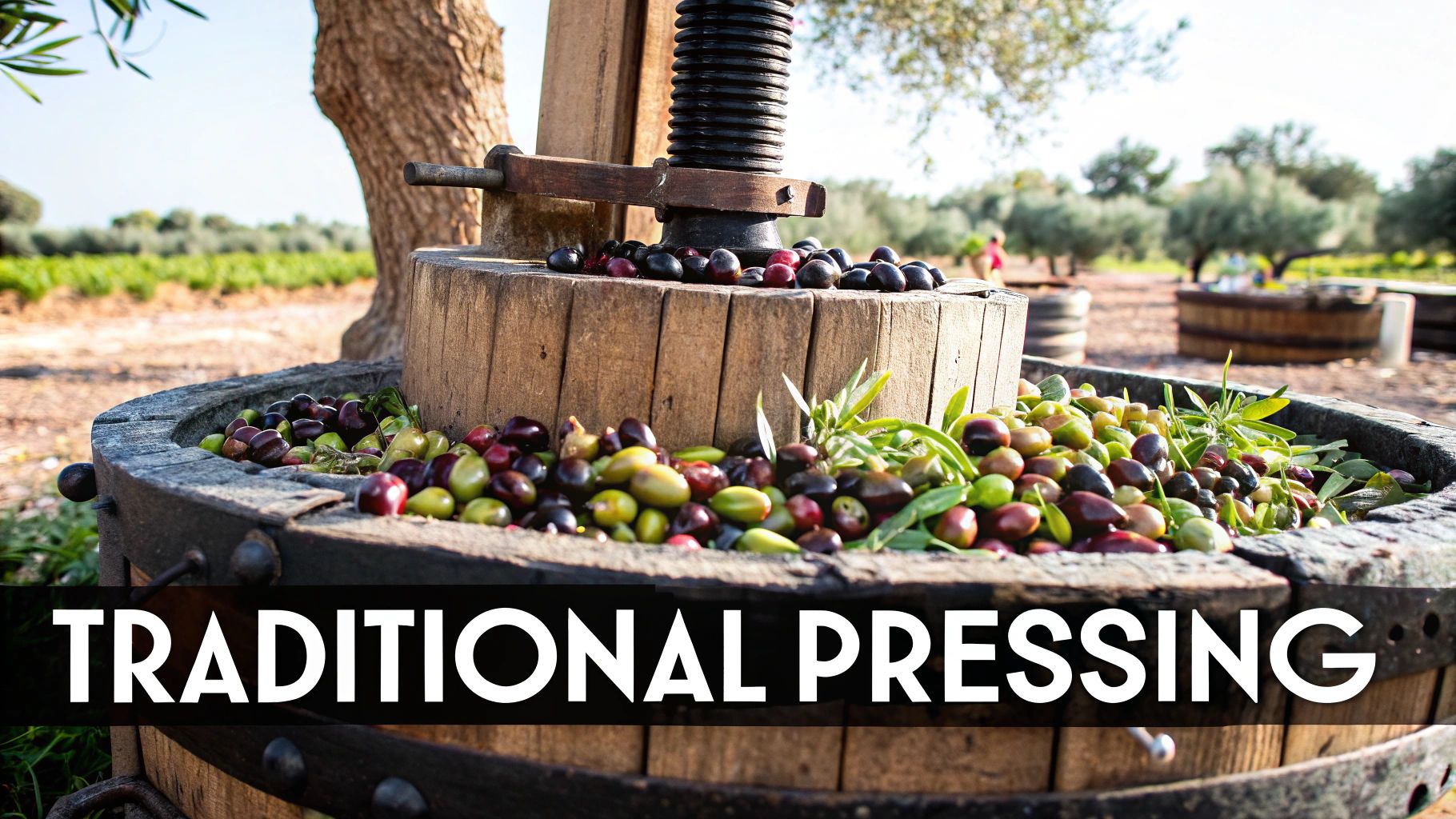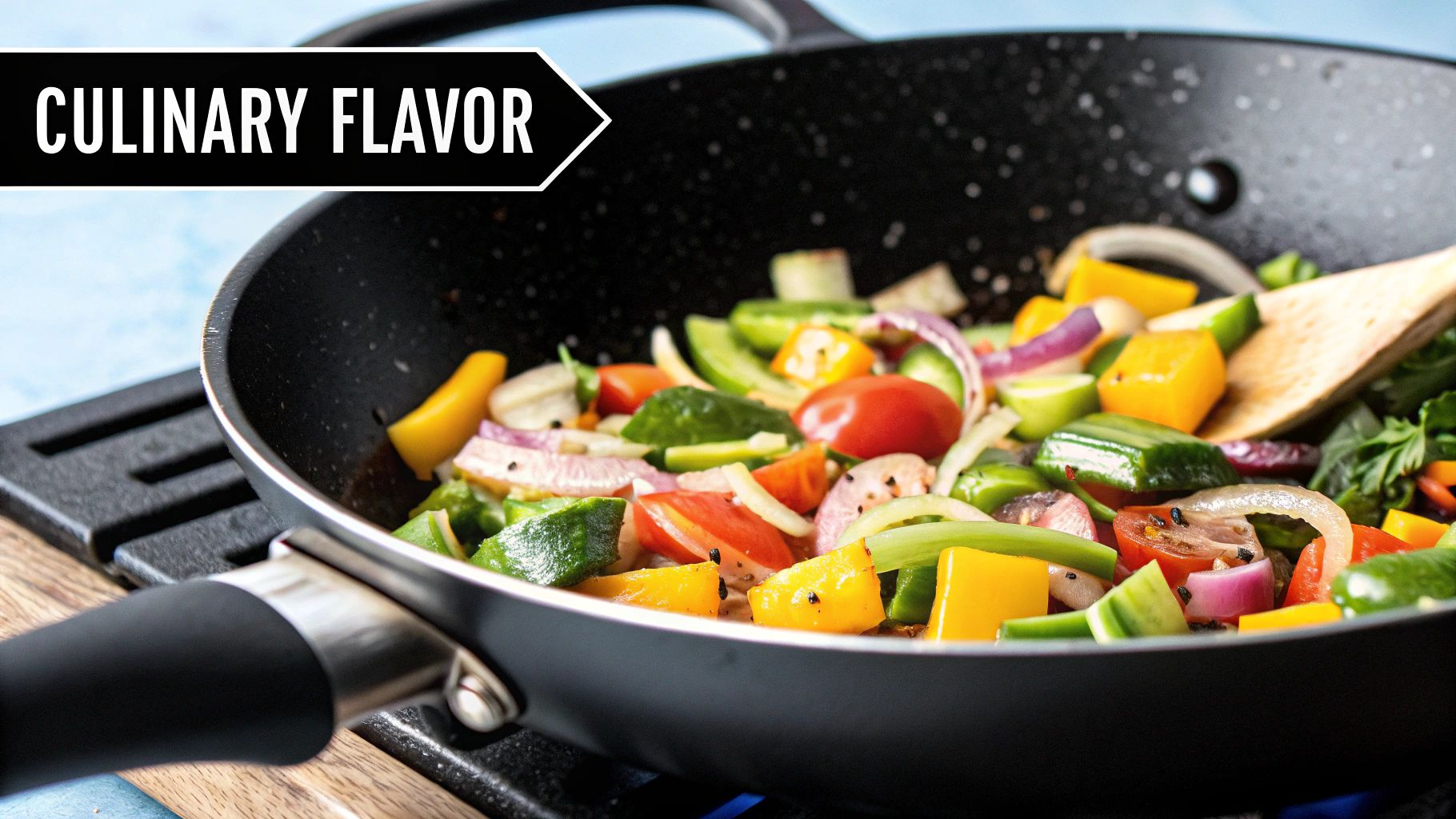A Guide to Organic Extra Virgin Olive Oil
- IFM GOURMET RETAIL
- Aug 27, 2025
- 14 min read
Updated: Aug 28, 2025
When you see "organic extra virgin olive oil" on a label, you're looking at the absolute best quality you can get. It’s the top tier of olive oil, celebrated for its incredible purity, flavor, and health benefits. The magic is in how it's made: simply by cold-pressing fresh olives. There's no heat and no chemicals involved, which keeps all the good stuff intact.
That "organic" seal is your guarantee that the olives were grown the way nature intended—without any synthetic pesticides or fertilizers.

What Makes Organic Extra Virgin Olive Oil So Special?
Walking down the olive oil aisle can feel a bit overwhelming with all the different terms on the bottles. But it's actually pretty simple once you break it down. The two most important things to look for are "extra virgin" and "organic." Each one tells you something specific about the oil's quality—one is about the milling process, and the other is about the farming.
Think of "extra virgin" as the olive's equivalent of fresh-squeezed juice. It's the purest oil, extracted only with mechanical methods in a process called cold-pressing. This gentle technique keeps the temperature low, which is crucial for preserving the oil's delicate, nuanced flavors, its beautiful aroma, and all those powerful antioxidants. To even qualify for this title, the oil must have a free acidity level below 0.8%.
The "organic" certification is another layer of quality assurance. It means the olives were grown in soil that has been free of prohibited stuff like synthetic fertilizers and pesticides for years. This commitment to natural farming doesn't just help the planet; it also means the oil you're buying is clean and free from chemical residues.
The Hierarchy of Olive Oil Quality
Let's be clear: not all olive oils are created equal. This quick visual shows you exactly where organic extra virgin olive oil sits in the quality lineup—right at the very top.
As you can see, even a standard extra virgin olive oil, while made the same way, doesn't come with the guarantee of organic farming. And once you get down to refined oils, you're looking at products that have been processed in ways that strip them of their natural character.
To help you see the differences at a glance, here’s a simple breakdown.
Olive Oil Grades At a Glance
Oil Grade | Processing Method | Acidity Level | Organic Certification |
|---|---|---|---|
Organic EVOO | Cold-pressed, no chemicals | Below 0.8% | Yes |
Extra Virgin | Cold-pressed, no chemicals | Below 0.8% | No |
Virgin | Cold-pressed, no chemicals | Below 2.0% | No |
Refined/Light | Chemically treated, heat | Varies | No |
This table really highlights how organic EVOO stands apart, combining the purest processing method with the highest agricultural standards.
A Tradition Rooted in History
The art of growing amazing olives goes back centuries. The Aegean region, for example, is a true powerhouse for producing organic extra virgin olive oil. In fact, Turkey, the world's fourth-largest producer, gets nearly half (48%) of its olives from this very area.
This isn't some new trend. Archaeologists have found ancient olive oil mills here dating all the way back to 600 BC. It’s a beautiful blend of historical craftsmanship and modern organic principles that you can taste in every bottle. You can read more about the deep history of olive cultivation in this area.
So, what does this all mean for you? Choosing an organic extra virgin olive oil is about selecting a product that is both minimally processed and sustainably farmed. It's the pinnacle of quality—giving you superior taste and total peace of mind.
Ultimately, having both "organic" and "extra virgin" on the label means you get the best of both worlds. You get that pure, flavorful oil from the very first press, plus the confidence that it was produced in harmony with nature.
Why Organic EVOO is So Good For You
Beyond its incredible flavor, organic extra virgin olive oil is a true wellness powerhouse. It’s a cornerstone of healthy eating, most famously in the Mediterranean diet, and for good reason. Think of it less as a simple cooking oil and more as a functional food that actively boosts your well-being with every single drop.
What’s its secret? It all comes down to its unique chemical makeup. The star of the show is a monounsaturated fat called oleic acid. This is one of the "good fats" you hear about, celebrated for its amazing effects on heart health, especially when it comes to keeping cholesterol levels in check.
But the story doesn't end with healthy fats. Organic EVOO is also brimming with powerful bioactive compounds, especially antioxidants.
The Power of Polyphenols
One of the biggest reasons to choose a high-quality organic extra virgin olive oil is its high concentration of polyphenols. These compounds are like the oil's personal bodyguards, protecting it from breaking down. When you consume them, they do the same for you, helping protect your body's cells from damage.
These mighty antioxidants fight back against oxidative stress—a process tied to chronic diseases and the aging process itself. Two of the most-studied polyphenols in EVOO, oleocanthal and oleacein, are rockstars for their anti-inflammatory properties. This natural, gentle anti-inflammatory action is a key reason EVOO is so beneficial for your entire body, from your joints to your heart.
Choosing 'organic' takes these benefits to the next level. An organic seal guarantees the oil was made without synthetic pesticides or herbicides. This means you're getting the purest form of these health-boosting compounds, with none of the unwanted chemical baggage.
The amount of these good-for-you compounds really depends on where the olives were grown and what kind they are.
Core Wellness Advantages
Making organic EVOO a regular part of your meals can support your health in some major ways. Its unique mix of healthy fats and antioxidants creates a powerful team.
Heart Health Hero: That high monounsaturated fat content helps lower LDL ("bad") cholesterol while keeping HDL ("good") cholesterol right where it should be.
Natural Inflammation Fighter: Compounds like oleocanthal have been shown to have anti-inflammatory effects that are often compared to ibuprofen.
Antioxidant Armor: Polyphenols hunt down and neutralize free radicals, shielding your cells from the long-term damage that leads to health problems.
Brain Booster: The combination of healthy fats and antioxidants in EVOO is also thought to support brain function and protect against age-related cognitive decline.
At the end of the day, making organic EVOO a staple in your kitchen is one of the simplest and most delicious things you can do for your health. It’s an easy way to nourish your body from the inside out.
How to Choose a High-Quality EVOO
Walking down the supermarket aisle can feel a bit overwhelming, right? You're faced with a wall of olive oil options, all vying for your attention. But to confidently pick a genuine, top-tier extra virgin olive oil, you need to know what you're looking for. It’s less about a fancy label and more about reading the clues that tell the real story of the oil's journey from the grove to the bottle.
Your first move is to become a label detective. Look right past the brand name and hunt for the single most important piece of information: the harvest date. Unlike a fine wine, olive oil absolutely does not get better with age. Freshness is everything. Always, always grab the oil from the most recent harvest you can find.
Next, take a good look at the packaging itself. High-quality EVOO is delicate stuff, and it has three main enemies: light, heat, and air. This is why you should only choose an oil that’s bottled in dark glass (think green or brown) or a completely opaque tin. A clear bottle might look pretty on the shelf, but it’s a huge red flag—constant light exposure will quickly degrade the oil’s incredible flavor and health benefits.
Decoding the Details on the Label
Beyond the harvest date and the bottle, a few other details on the label can point you toward a superior product loke for instance if ypu are looking for an organic olive oil. These are your little assurances of authenticity and quality.
Country of Origin: Look for a specific country or, even better, a specific region. Vague terms like "packed in Italy" or "product of multiple countries" can be a sign of a lower-quality blend from various sources.
Organic Certification Seal: A true organic product will proudly display an official certification seal (like the EU organic logo or the USDA organic seal). This is your guarantee that the olives were grown without any synthetic pesticides or fertilizers.
Estate Name: The very best oils often come from a single, dedicated estate. If the label names the specific farm or mill, it’s a fantastic sign of traceability and a producer who takes immense pride in their product.
Think of buying olive oil like you’re at a farmers' market buying fresh produce. You want to know where it came from and when it was picked. The more specific the information, the more confident you can be in its quality.
What to Look For in Taste
Of course, the ultimate test is in the tasting. Don't be surprised if a truly top-tier organic EVOO has a bold, even assertive, flavor. In fact, some of the key signs of a fresh, high-polyphenol oil might seem a little unusual at first.
A great EVOO should smell fruity and fresh, maybe like green almonds or freshly cut grass. When you taste it, you should notice a distinct bitter note on your tongue, followed by a peppery or pungent sensation right at the back of your throat. That little peppery kick, the one that might even make you cough? That’s the work of oleocanthal—one of those powerhouse anti-inflammatory compounds we talked about earlier. These aren't flaws; they are the signature characteristics of an authentic, antioxidant-rich olive oil.
Cooking with EVOO Beyond Salads
It’s time to move your bottle of organic extra virgin olive oil from the pantry shelf to a starring role in your everyday cooking. While it’s the undisputed champion of salad dressings, keeping this liquid gold just for raw dishes means you’re missing out on a world of flavor.
High-quality EVOO is an amazing cooking partner, able to elevate dishes in ways you might not expect.
One of the easiest ways to start is by using it as a finishing oil. A simple drizzle over a finished dish right before serving can completely change its character. The heat from the food gently opens up the oil's aromatic compounds, adding a layer of fresh, fruity, or peppery notes that ties everything together.
This technique works beautifully on almost anything—try it over roasted vegetables, grilled fish, a hearty bowl of soup, or a simple pasta dish.
Expanding Your Culinary Horizons
But let's move beyond just drizzling. A high-quality EVOO has a robust flavor profile that stands up well to heat, infusing your food with a nuanced taste that other oils just can't deliver.
Roasting and Sautéing: Tossing vegetables in EVOO before roasting brings out their natural sweetness and helps them caramelize beautifully. It’s also perfect for sautéing aromatics like garlic and onions to create a fragrant base for sauces and stews.
Grilling and Marinating: Before you fire up the grill, use EVOO in your marinade for meat, poultry, or fish. It helps tenderize the protein and stops it from sticking, all while adding that rich, Mediterranean flavor.
Baking Adventures: This might surprise you, but substituting EVOO for butter in certain baked goods can produce wonderfully moist results. It works especially well in recipes like olive oil cakes and rustic breads, lending a subtle complexity.
A common myth is that you can't cook with extra virgin olive oil because of a low smoke point. The reality is that a good quality organic EVOO has a smoke point of around 190-204°C, making it perfectly safe for most home cooking, including light frying.

To truly make your dishes shine, the quality of all your ingredients matters. For chefs and home cooks in the UAE looking for exceptional products, exploring specialty suppliers can make all the difference.
For instance, IFM Gourmet Dubai—the luxury online gourmet arm of IFM Investments LLC, part of the broader Italian Food Masters group—is known for quality, authenticity, and culinary elegance in Dubai’s gourmet scene. Their impressive lineup of artisanal delicacies includes bronze die pasta, speciality sauces, premium healty water, sweets, savories, fine chocolates, premium teas, cakes, and beautifully curated gift hampers and much more. Finding sources like this allows you to pair your cooking with equally exceptional ingredients.
Ready for another great pairing? Learn about the versatility of premium balsamic vinegar.
Keeping Your Olive Oil at Its Best
So you've brought home a fantastic bottle of organic extra virgin olive oil. The next step is making sure it stays that way. Keeping that vibrant flavor, fresh aroma, and all those amazing health benefits is actually pretty simple—as long as you protect it from its three biggest enemies: heat, light, and air.
When olive oil is exposed to any of these, a process called oxidation kicks in. This is what breaks down the oil, degrading its quality and eventually turning it rancid. Storing it properly ensures that every pour, from the first to the last, is as good as it should be.
How to Defeat the Three Enemies of Olive Oil
Proper storage isn't rocket science. It’s all about giving your oil a safe haven away from things that can harm it. The perfect spot is somewhere cool and dark, which is why a kitchen pantry or cupboard is your best bet.
The number one rule? Keep it away from the stove. It might feel convenient to have your oil right there while you're cooking, but the constant heat cycles will make it go bad much faster. The same goes for a sunny countertop or a spot near a window.
Think of your organic EVOO like a fine spice or a premium tea. You wouldn't leave those out in the open to get blasted by heat and light, right? The same logic applies here—you have to protect its delicate character.
Also, always make sure the cap is screwed on tight after you use it. This tiny step is huge because it keeps oxygen out. Air is just as damaging as heat and light, so a good seal is non-negotiable for preventing oxidation.
The Great Refrigerator Debate
People often ask if they should store olive oil in the fridge. The short answer is no. While it won't ruin the oil for good, chilling it causes it to get cloudy and solidify.
This back-and-forth of solidifying and turning back into a liquid can introduce condensation inside the bottle, which can mess with the flavor over time. Just stick to these simple rules, and your organic extra virgin olive oil will stay fresh and delicious.
Find a Cool, Dark Home: A pantry or cupboard is ideal, far from direct sunlight.
Avoid the Heat: Steer clear of the stove, oven, or any other appliance that gets warm.
Seal It Up: Always twist the cap on securely to lock out air and stop oxidation in its tracks.
Use It Up: For the absolute best flavor, try to finish the bottle within 3 to 6 months of opening it.
Why the Origin of Your Olive Oil Matters
The story of an olive oil starts long before it ever makes it to your kitchen. That final, complex taste you experience—the aroma, the color, the flavor—is a direct reflection of its home. Just like a fine wine is defined by its vineyard, the specific place an olive grows gives the oil a unique fingerprint.
This sense of place, what experts call terroir, is a combination of everything: the climate, the soil, and even the specific variety of olive, known as a cultivar. An oil from the sun-drenched groves of the Aegean will taste completely different from one made in the rolling hills of Apulia or Tuscany. Understanding this journey from tree to bottle not only deepens your appreciation but also helps you pick an oil that perfectly matches what you love.
In the best olive-growing regions, generations of tradition meet modern organic standards to create something truly special. The result is a product that tells the story of its homeland in every single drop.
The Influence of Terroir on Flavor
The environment where olives grow is the true artist behind an oil's flavor profile. A whole symphony of elements works together to create a signature taste that you just can't replicate anywhere else. This is exactly why knowing the origin of your organic extra virgin olive oil is so crucial.
Climate: Think about the Mediterranean—long, hot summers and mild winters. This kind of climate produces olives with incredibly concentrated, rich flavors. The amount of sun and rain directly affects the olive's natural sugars and powerful polyphenols.
Soil: The ground itself plays a huge role. Whether it's rocky, clay-based, or sandy, the soil changes the nutrients the olive tree absorbs. This can lead to all sorts of undertones in the oil, from earthy and nutty to herbaceous and floral.
Cultivar: There are hundreds of olive varieties, and each one brings its own personality to the table. For example, an Arbequina olive from Spain usually gives you a mild, buttery oil. A Greek Koroneiki, on the other hand, produces a bold, peppery oil with a fresh, grassy aroma.
Learning about these factors is like learning to speak the language of olive oil. That peppery kick at the back of your throat isn't just a random flavor; it's the taste of a specific cultivar, grown in a particular climate, and harvested at the perfect moment to capture its potent antioxidants.
2023–2024 Crop Year in Italy
Approximately 324,000 tonnes of olive oil were produced in the 2023/24 crop year.
This marked a significant rebound—up roughly 35% from the previous year, with better yields especially in southern regions like Puglia
Quality Factors of Italian Olive Oil
Protected Designations
Italy has the highest number of PDO (Protected Designation of Origin) and PGI (Protected Geographical Indication) olive oils in the world (over 40 PDOs and several PGIs).
Examples: Toscano IGP, Umbria DOP, Terra di Bari DOP, Garda DOP.
These labels certify authenticity, origin, and production methods.
Flavor Profiles
Italian olive oils vary widely by region:
Puglia → rich, strong, often with tomato and almond notes.
Tuscany → robust, peppery, bitter, with grassy notes.
Liguria → delicate, mild, sweet, fruity (Taggiasca olives).
Sicily → aromatic, herbaceous, hints of citrus and artichoke.
This diversity makes Italy’s oils prized by chefs for pairing with different foods.
Production Standards
Most Italian extra virgin olive oil (EVOO) is cold-extracted below 27°C to preserve antioxidants and aromas.
Strict chemical and sensory analysis is required for Extra Virgin status (acidity ≤ 0.8%).
Nutritional & Health Quality
High in polyphenols (antioxidants), vitamin E, and monounsaturated fatty acids.
Italian oils, especially from traditional cultivars, often have high polyphenol levels, giving them bitterness and pungency—both signs of freshness and quality.
Reputation
Italy has a strong reputation
To counter this, more producers now emphasize traceability, single-estate production, and blockchain/QR code systems for transparency.
Italy produces some of the world’s best EVOOs, with huge regional variety.
Strengths: quality certifications, traditional cultivars, rich flavors, health benefits.
Frequently Asked Questions About Organic EVOO
Diving into the world of premium oils can definitely bring up a few questions. To help you get the most out of every single bottle, here are some straightforward answers to the things people wonder most about organic extra virgin olive oil.
Can I Cook With Organic Extra Virgin Olive Oil?
Absolutely. It’s a common myth that you can't. While it's legendary in dressings and for dipping, high-quality EVOO is actually a fantastic cooking oil.
A genuine organic extra virgin olive oil has a smoke point hovering around 190-204°C (375-400°F). That’s more than high enough for most of your daily cooking—think sautéing vegetables, roasting, and even some light frying. The healthy monounsaturated fats in EVOO are also much more stable at moderate heat than the polyunsaturated fats you find in many other common kitchen oils.
What Is The Difference Between Cold-Pressed and Extra Virgin?
This is a great question, and the two terms are very closely related—they often describe the same high-quality process.
"Extra virgin" is the official grade. It’s a seal of quality certifying that the oil meets stringent chemical tests and sensory standards. A key part of that certification is that it must be extracted without using high heat or chemical solvents.
"Cold-pressed" is the how. It describes the mechanical method used to get that premium oil. The process ensures temperatures stay low, which is crucial for protecting the oil’s delicate flavors, all its nutrients, and those powerful antioxidants. So, in reality, all true extra virgin olive oil is made using a cold-press method.
How Long Does Organic EVOO Last Once Opened?
For the best possible flavor and peak health benefits, you'll want to use an open bottle of organic EVOO within three to six months. Olive oil isn't like wine; it doesn't get better with age and is always best enjoyed fresh.
Proper storage is everything when it comes to preserving its quality. Keep the cap sealed tightly and store the bottle in a cool, dark spot—like a pantry—away from direct heat and light. This prevents oxidation, which is what makes oil go rancid.
Following these simple tips will ensure that from the very first pour to the last drop, your organic extra virgin olive oil gives you the amazing taste and wellness perks you're looking for. Its pure quality and incredible versatility make it a true kitchen essential.
Discover a curated selection of authentic, high-quality ingredients to elevate your culinary creations. Explore the world of fine foods with IFM Gourmet Food Store and bring the taste of Italy to your home. Find your perfect gourmet products today.












Comments